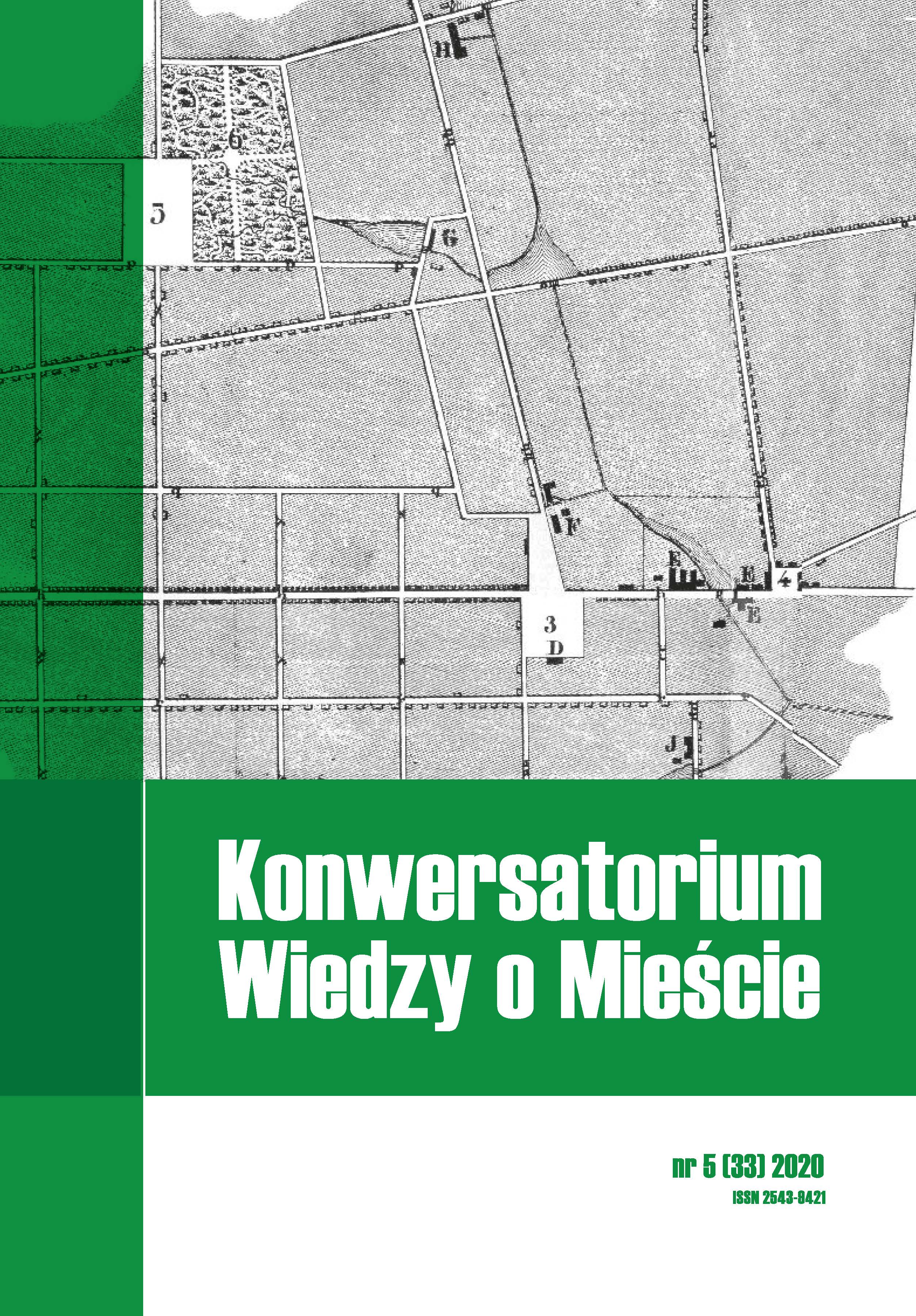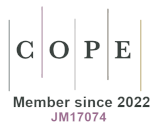Spatial and functional aspects of the night-time economy in historic cities: a case study of the Kazimierz district (Kraków, Poland)
DOI:
https://doi.org/10.18778/2543-9421.05.05Keywords:
historic city, night-time economy, nocturnal city, PolandAbstract
Historic cities constitute a special category of urban area in Poland. Due to their cultural potential, tourism and related sectors are currently becoming an important development direction. One such sector is their night-time economy, identified on the basis of a time criterion (21:00-5:00), and a functional criterion (understood as all activities that meet people’s broad leisure needs outside their home during the night). The aim of the article is to describe the night-time economy in one historical central district of Kraków – Kazimierz. The authors, based on a field inventory conducted in 2019, and interviews with representatives of the local community, have illustrated the spatial and functional aspects of this phenomenon.
References
Ashworth, G.J., Tunbridge, J.E. (2000). The tourist-historic city. London: Routledge.
Google Scholar
DOI: https://doi.org/10.4324/9780080519470
Ashworth, G.J., Tunbridge J.E. (2004). Whose tourist-historic city? Localizing the Gobal and globalizing the local. W: A. Lew, M. Hall, A. Williams (red.), A Companion to Tourism. Malden–Oxford–Carlton: Blackwell Publishing.
Google Scholar
Bianchini, F. (1995). Night cultures, night economies. Planning Practice & Research, 10 (2), 121–126.
Google Scholar
DOI: https://doi.org/10.1080/02697459550036667
Campo, D., Ryan, B.D. (2008). The entertainment zone: Unplanned nightlife and the revitalization of the American downtown. Journal of Urban Design, 13 (3), 291–315. https://doi.org/10.1080/13574800802319543
Google Scholar
DOI: https://doi.org/10.1080/13574800802319543
Chatterton, P. (2002). Governing nightlife: Profit, fun and (dis)order in the contemporary City. Entertainment Law, 1 (2), 23–49. https://doi.org/10.1080/14730980210001730411
Google Scholar
DOI: https://doi.org/10.1080/14730980210001730411
Cohen-Hattab, K. (2004). Historical research and tourism analysis: The case of the tourist-historic city of Jerusalem. Tourism Geographies, 6 (3), 279–302. https://doi.org/10.1080/1461668042000249629
Google Scholar
DOI: https://doi.org/10.1080/1461668042000249629
„Dobra Noc Kraków” (2019). Pobrane z: https://www.facebook.com/groups/dobranockrakow (11.10.2019).
Google Scholar
Działek, J., Murzyn-Kupisz, M. (2015). Zachowania i preferencje przestrzenne młodych artystów w mieście na przykładzie Krakowa i Katowic. W: P. Trzepacz, J. Więcław-Michniewska, A. Brzosko-Sermak, A. Kołoś, Miasto w badaniach geografów. T. 1 (s. 91–120). Kraków: Instytut Geografii i Gospodarki Przestrzennej Uniwersytetu Jagiellońskiego w Krakowie.
Google Scholar
Faracik, R. (2017). Sandomierz – miasto historyczne jako ośrodek turystyki. Turyzm, 27 (2), 35–44. https://doi.org/10.18778/0867-5856.27.2.03
Google Scholar
DOI: https://doi.org/10.18778/0867-5856.27.2.03
Grochowicz, M. (2019). Konflikty przestrzenne wokół placu Nowego na krakowskim Kazimierzu. W: Ł. Fiedeń, K. Anielska, (red.), Współczesne problemy i kierunki badawcze w geografii. T. 7 (83–102). Kraków: Instytut Geografii i Gospodarki Przestrzennej Uniwersytetu Jagiellońskiego w Krakowie.
Google Scholar
Hadfield, P., Lister, S., Traynor, P. (2009). This town’s a different town today. Policing and regulating the night-time economy. Criminology & Criminal Justice, 9 (4), 465–485. https://doi.org/10.1177/1748895809343409
Google Scholar
DOI: https://doi.org/10.1177/1748895809343409
Iwanicki, G., Dłużewska, A. (2015). Potential of city break clubbing tourism in Wrocław. Biulletin of Geography. Socioeconomic Series, 28, 77–90. https://doi.org/10.1515/bog-2015-0017
Google Scholar
DOI: https://doi.org/10.1515/bog-2015-0017
Iwanicki, G., Dłużewska, A. (2018). Party space in Cracow and Warsaw: Partying and conflicts. Economic Problems of Tourism, 4, 139–145. https://doi.org/10.18276/ept.2018.4.44-11
Google Scholar
DOI: https://doi.org/10.18276/ept.2018.4.44-11
Kotus, J. (2015). Turyści w strukturze miast: obraz konfliktu czy koegzystencji? – rozważania na podstawie badań city users w dwóch miastach. Rozwój Regionalny i Polityka Regionalna, 31, 33–46. https://doi.org/10.14746/rrpr.2015.31.04
Google Scholar
DOI: https://doi.org/10.14746/rrpr.2015.31.04
Kowalczyk-Anioł, J. (2019). Hipertrofia turystyki miejskiej – geneza i istota zjawiska. Konwersatorium Wiedzy o Mieście, 32 (4), 7–18. https://doi.org/10.18778/2543-9421.04.01
Google Scholar
DOI: https://doi.org/10.18778/2543-9421.04.01
Kowalczyk-Anioł, J., Zmyślony, P. (2017). Turystyka miejska jako źródło protestów społecznych: przykłady Wenecji i Barcelony. Turystyka Kulturowa, 2, 7–36.
Google Scholar
Kruczek, Z., Walas, B., Chromy, J. (2019). Od euforii do irytacji. Analiza postaw mieszkańców Krakowa, hotelarzy i restauratorów wobec dalszego rozwoju turystyki. W: M. Zowiosło, J. Kosiewicz, Sport i turystyka w perspektywie nauk społecznych: tradycje i współczesność (s. 287–298). Kraków: Akademia Wychowania Fizycznego.
Google Scholar
Kursa, M. (2019). Nadchodzi nocny burmistrz Krakowa. Czym się zajmie?. Pobrane z: https://krakow.wyborcza.pl/krakow/7,44425,24824816,nadchodzi-nocny-burmistrz-krakowa-czym-sie-zajmie.html (11.10.2019).
Google Scholar
van Liempt, I., van Aalst, I., Schwanen, T. (2015). Introduction: Geographies of the urban night. Urban Studies, 52 (3), 407–421. https://doi.org/10.1177/0042098014552933
Google Scholar
DOI: https://doi.org/10.1177/0042098014552933
London at night: An evidence base for a 24-hour city (2018). GLA Economics, London. Pobrane z: https://www.london.gov.uk/sites/default/files/london-at-night-full-final.pdf (11.10.2019).
Google Scholar
Lovatt, A., O’Connor, J. (1995). Cities and the night-time economy. Planning Practice & Research, 2 (10), 127–134. https://doi.org/10.1080/02697459550036676
Google Scholar
DOI: https://doi.org/10.1080/02697459550036676
Mika, M. (red.) (2011), Kraków jako ośrodek turystyczny. Kraków: Instytut Geografii i Gospodarki Przestrzennej Uniwersytetu Jagiellońskiego w Krakowie.
Google Scholar
Mikulska, P. (2018). Nowy pomysł Trzaskowskiego. „Nocny burmistrz”, który kontroluje Warszawę. Pobrane z: https://wiadomosci.wp.pl/nowy-pomysl-trzaskowskiego-nocny-burmistrz-ktory-kontroluje-warszawe-6283322663995009a (11.10.2019).
Google Scholar
Mróz, K. (2019). Geograficzne aspekty funkcjonowania gospodarki nocnej w miastach historycznych na przykładzie krakowskiego Kazimierza. Praca dyplomowa napisana pod kierunkiem dr R. Pawlusińskiego w Instytucie Geografii i Gospodarki Przestrzennej Uniwersytetu Jagiellońskiego w Krakowie.
Google Scholar
Murzyn, M. (2006). Kazimierz. Środkowoeuropejskie doświadczenie rewitalizacji. Kraków: Międzynarodowe Centrum Kultury.
Google Scholar
Murzyn-Kupisz, M. (2008). Przywracanie pamięci czy masowa konsumpcja? Dylematy odkrywania żydowskiego dziedzictwa kulturowego krakowskiego Kazimierza. W: M. Murzyn-Kupisz, J. Purchla (red.), Przywracanie pamięci. Rewitalizacja zabytkowych dzielnic żydowskich w miastach Europy Środkowej (s. 363–398). Kraków: Międzynarodowe Centrum Kultury.
Google Scholar
Nofre, J., Giordano, E., Eldridge, E., Martins, J.C. (2017). Tourism, nightlife and planning: Challenges and opportunities for community liveability in La Barceloneta. Tourism Geographies, 3 (20), 377–396. https://doi.org/10.1080/14616688.2017.1375972
Google Scholar
DOI: https://doi.org/10.1080/14616688.2017.1375972
Nofre, J., Martins, J.C., Vaz, D., Fina, R., Sequera, J., Vale, P. (2018). The “Pink Street” in Cais do Sodré: Urban change and liminal governance in a nightlife district of Lisbon. Urban Research & Practice, 12 (4), 1–19. https://doi.org/10.1080/17535069.2018.1449010
Google Scholar
DOI: https://doi.org/10.1080/17535069.2018.1449010
Pawlusiński, R., Kubal, M. (2011). Tradycje turystyczne Krakowa. W: M. Mika (red.), Kraków jako ośrodek turystyczny (s. 35–56). Kraków: Instytut Geografii i Gospodarki Przestrzennej Uniwersytetu Jagiellońskiego w Krakowie.
Google Scholar
Pawlusiński, R., Kubal-Czerwińska, M. (2018). A new take on an old structure? Creative and slow tourism in Krakow (Poland). Journal of Tourism and Cultural Change, 16 (3), 265–285. https://doi.org/10.1080/14766825.2017.1330338
Google Scholar
DOI: https://doi.org/10.1080/14766825.2017.1330338
Pawlusiński, R., Zmyślony, P. (2018). Gospodarka nocna a oferta kulturowa miast. Turystyka Kulturowa, 7, 7–22.
Google Scholar
Pinke-Sziva, I., Smith, M., Olt, G., Berezvai Z. (2019). Overtourism and the night-time economy: A case study of Budapest. International Journal of Tourism Cities, 5 (1), 1–16. https://doi.org/10.1108/IJTC-04-2018-0028
Google Scholar
DOI: https://doi.org/10.1108/IJTC-04-2018-0028
Radkowski, M. (2019). Ma go Paryż i Amsterdam. Warszawa czeka na nocnego burmistrza. Co będzie robił? Pobrane z: https://warszawa.wyborcza.pl/warszawa/7,54420,25482441,ma-go-paryz-i-amsterdam-warszawa-czeka-na-nocnego-burmistrza.html (11.10.2019).
Google Scholar
Roberts, M. (2006). From „creative city” to „no-go areas”: The expansion of the night-time economy in British town and city centres. Cities, 23 (5), 331–338. https://doi.org/10.1016/j.cities.2006.05.001
Google Scholar
DOI: https://doi.org/10.1016/j.cities.2006.05.001
Roberts, M., Eldridge, A. (2009). Planning the night-time city. New York: Routledge.
Google Scholar
Rowe, D. (2008). Culture, sport and night-time economy. International Journal of Cultural Policy, 14 (4), 399–415. https://doi.org/10.1080/10286630802445864
Google Scholar
DOI: https://doi.org/10.1080/10286630802445864
Salamon, P. (2019). W Krakowie będzie nocny burmistrz. Pobrane z: https://lovekrakow.pl/aktualnosci/w-krakowie-bedzie-nocny-burmistrz_31081.html (11.10.2019).
Google Scholar
Seijas, A., Gelders, M.M. (2020). Governing the night time city: The rise of night mayor as a new form of urban governance after dark. Urban Studies, 58 (2), 1–19. https://doi.org/10.1177/0042098019895224
Google Scholar
DOI: https://doi.org/10.1177/0042098019895224
Shaw, R. (2014). Beyond night-time economy: Affective atmospheres of the urban night. Geoforum, 51 (1), 87–95. https://doi.org/10.1016/j.geoforum.2013.10.005
Google Scholar
DOI: https://doi.org/10.1016/j.geoforum.2013.10.005
Shaw, R. (2020). Geographies of the night. International Encyclopedia of Human Geography, Second Edition, 6, 83–87. https://doi.org/10.1016/B978-0-08-102295-5.10187-8
Google Scholar
DOI: https://doi.org/10.1016/B978-0-08-102295-5.10187-8
Sheard, L. (2011). Anything could have happened: Women, the night-time economy, alcohol and drink spiking. Sociology, 45 (4), 619–633. https://doi.org/10.1177/0038038511406596
Google Scholar
DOI: https://doi.org/10.1177/0038038511406596
Think night: London`s neighbourhoods 6PM to 6AM. London night time commision. Pobrane z: https://www.london.gov.uk/sites/default/files/think_night_-_londons_neighbourhoods_from_6pm_to_6am.pdf (11.10.2019).
Google Scholar
Tymczak, P. (2019). Kraków. Prezydentowi ma pomagać nocny burmistrz. Zobacz, jak wygląda nocne życie w mieście. Pobrane z: https://dziennikpolski24.pl/krakow-prezydentowi-ma-pomagac-nocny-burmistrz-zobacz-jak-wyglada-nocne-zycie-w-miescie-zdjecia/ar/c1-14144189 (11.10.2019).
Google Scholar
Uchwała Rady Miasta Krakowa z 26 czerwca 2019 r. w sprawie ustalenia kierunków działania dla Prezydenta Miasta Krakowa w zakresie powołania Komisji Nocnego Burmistrza. Nr XIX/389/19.
Google Scholar
Więcław, J. (1997). Zmiany funkcji dzielnicy Kazimierz w Krakowie w świetle współczesnych przekształceń społeczno-gospodarczych. Folia Geographica. Series Geographica Oeconomica, XXIX–XXX, 125–147.
Google Scholar
Zmyślony, P., Pawlusiński, R. (2020). Tourism and the night-time economy: The perspective article. Tourism Review, 75 (1), 194–197. https://doi.org/10.1108/TR-05-2019-0158
Google Scholar
DOI: https://doi.org/10.1108/TR-05-2019-0158
Downloads
Published
How to Cite
Issue
Section
License

This work is licensed under a Creative Commons Attribution-NonCommercial-NoDerivatives 4.0 International License.









